

Developing a Strategic Vision for Your Career Plan. Printer-Friendly Version by Randall S.
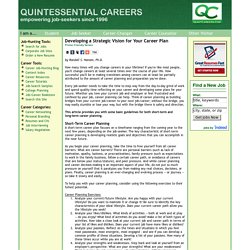
Hansen, Ph.D. Meaningful Work. A well-known story relates the following encounter (adapted from Ryan, 1977): Three men are found smashing boulders with iron hammers.
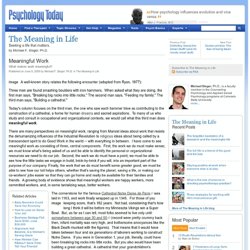
When asked what they are doing, the first man says, "Breaking big rocks into little rocks. " The second man says, "Feeding my family. " The third man says, "Building a cathedral. " Today's column focuses on the third man, the one who saw each hammer blow as contributing to the construction of a cathedral, a home for human dreams and sacred aspirations. Larry Smith: Why you will fail to have a great career. Why You Will Fail to Have a Great Career [The Interview] It’s Not About You. But, especially this year, one is conscious of the many ways in which this year’s graduating class has been ill served by their elders.
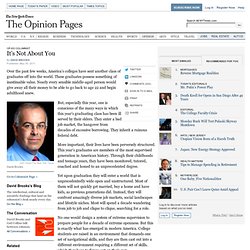
They enter a bad job market, the hangover from decades of excessive borrowing. How to Find Your Vocation. Remember Just Two Words to Love your Job More! In a challenging economy with limited job options it can be easy for many to feel discouraged and disappointed about their work.
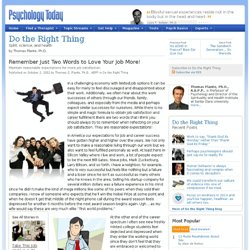
Additionally, we often hear about the work successes of others through our friends, family, colleagues, and especially from the media and perhaps expect similar successes for ourselves. While there is no simple and magic formula to obtain job satisfaction and career fulfillment there are two words that I think you should always try to remember when reflecting on your job satisfaction.
How to Find Your Best Career & Get Paid Doing What You Love. "H ave the courage to follow your heart and intuition. They somehow already know what you truly want to become. Everything else is secondary.” – Steve Jobs. Leaving Academia: The Transition Begins. In my last blog post , I wrote about how graduate students need to start thinking about the nonacademic job search.
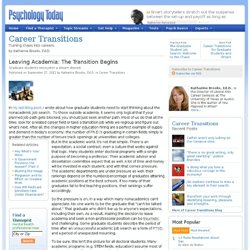
To those outside academia, it seems only logical that if your planned job path gets blocked, you should just seek another path. Most of us do that all the time: look for a related career field or take a transition job while we regroup and figure out what's next. After all, the changes in higher education hiring are a perfect example of supply and demand in today's economy: the number of Ph.D.'s graduating in certain fields simply is greater than the number of tenure track openings at universities and colleges.
Ten Myths About Choosing a Career. TOP TIPS FOR JOB HUNTERS: How to Find the Right Job for You. Over your lifetime you may make several career switches and have at least 12 different jobs.
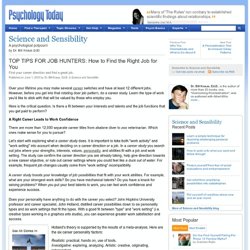
However, before you get into that rotating door job pattern, do a career study. Learn the type of work you'd like to stick with that will be valued by those who employ you. Here is the critical question. The Graduate Student Job Search: Welcome to the Chaos. Anyone reading the Chronicle of Higher Education can't help but notice a trend in their career advice columns: an increasing recognition that many graduate students will not be working in traditional academic careers.
A recent article in the Chronicle reports on a group that will examine ways to help graduate students move into careers. An article by Professor Lennard Davis at The University of Illinois at Chicago provides helpful advice to graduate students . The Chronicle also recently published an article on what faculty can do to help and even an article about changing the way we socialize doctoral students .
The Number One Cause of College Unhappiness. During the next couple of weeks, twenty-million students will head off to college.
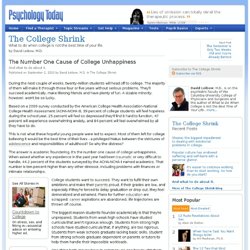
The majority of them will make it through those four or five years without serious problems. They'll succeed academically, make lifelong friends and have plenty of fun. A sizable minority, however, won't be so lucky. Based on a 2009 survey conducted by the American College Health Association-National College Health Assessment (ACHA-NCHA II), 39 percent of college students will feel hopeless during the school year, 25 percent will feel so depressed they'll find it hard to function, 47 percent will experience overwhelming anxiety, and 84 percent will feel overwhelmed by all they have to do. Career Transitions for Graduate Students and Others. Welcome graduate students (and others in career transition).
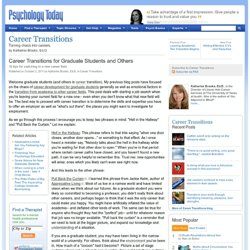
My previous blog posts have focused on the chaos of career development for graduate students generally as well as emotional factors in the transition from academia to other career fields . 10 Tips for Developing an Alternate Career While in Graduate School. There's a lot of talk in academic circles about "alternate" careers for graduate students.
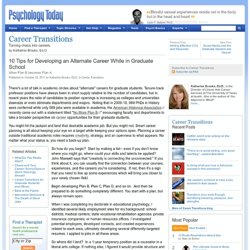
Tenure-track professor positions have always been in short supply relative to the number of candidates, but in recent years the ratio of candidates to position openings is increasing as colleges and universities downsize or even eliminate departments and majors. Noting that in 2009-10, 989 PhDs in History were conferred while only 569 jobs were available in academia, the American Historical Association recently came out with a statement titled " No More Plan B " encouraging faculty and departments to take a broader perspective on career opportunities for their graduate students. You might hit the jackpot and land that desirable academic job. The Psychology of Career Choices: Why Personality Matters. The study of vocational interests has preoccupied Psychologists for ages. The reasons are obvious: first, work constitutes one of the most important activties in our lives (i.e., most adults spend more time working than sleeping and having fun); second, even in the era of "flexi-workers" and career mobility, most people stick to the professional area of job sector they first select; third, just like with romantic partners, most people have difficulties choosing jobs or careers they really like (and they often regret their choices).
Thus vocational interests is a highly applied area of Psychology because it has implications for educators, employers, and counselors, as well as every individual hoping to improve their understanding of their "occupational fit". Indeed, Holland's theory was so predictive that there was little room for anything else after it. In recent years, the topic of Vocational Interests has received re-newed attention from mainstream personality researchers. Being Good at Something Doesn’t Mean You Should Be Doing It. In the first week of the 5th grade, our class had a special music afternoon.
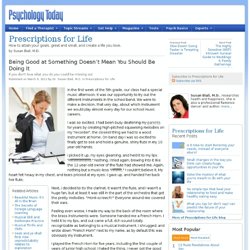
It was our opportunity to try out the different instruments in the school band. We were to make a decision, that very day, about which instrument we would play almost every day for our school music careers. I was so excited.